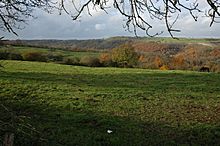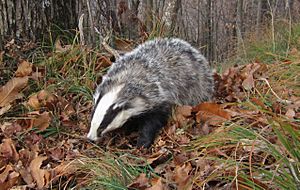Woodchester Park SSSI facts for kids
| Site of Special Scientific Interest | |

View over Woodchester Park, Gloucestershire
|
|
| Area of Search | Gloucestershire |
|---|---|
| Coordinates | 51°42′38″N 2°16′39″W / 51.710666°N 2.277596°W |
| Interest | Biological |
| Area | 214.9 hectare |
| Notification | 1966 |
Woodchester Park is a special place in Gloucestershire, England. It covers about 215 hectares, which is like 530 football fields! In 1966, it was named a Site of Special Scientific Interest (SSSI). This means it's a very important area for its plants, animals, and natural features. The government protects these sites to make sure they stay healthy and safe for wildlife.
Contents
Where is Woodchester Park?
Woodchester Park is found in a quiet, hidden valley in the Cotswolds. This area is known for its beautiful rolling hills. The ground here is made of old Jurassic rocks like limestone and clay. Because of these different rocks, the park has many types of places for plants and animals to live. These include thick woodlands, open grasslands, and wet areas like ponds.
Amazing Plants of Woodchester Park
Most of Woodchester Park is covered by trees. These woodlands are managed to grow timber, but they also have parts that are very old and natural. You can find trees like beech and ash, along with wild cherry and yew trees.
Some rare plants also grow here. These include:
- Fingered sedge, a grass-like plant.
- Angular Solomon's seal, which has bell-shaped flowers.
- Stinking hellebore, a plant with green flowers.
- Lily-of-the-valley, known for its sweet-smelling white flowers.
Wildlife and Animals

Woodchester Park is home to many different animals. One of the most famous spots is the Woodchester Mansion. This old, unfinished house is a very important home for a large group of greater horseshoe bats. These bats fly out at night to hunt for insects in the nearby fields where cows graze. Scientists have been studying these bats since the 1950s to learn more about them.
The valley is also a fantastic place for insects. You can see many types of butterflies, moths, and dragonflies. There are even some rare kinds of snails living here.
Birds and Other Creatures
The park is full of birds, too. Many different types of birds build their nests and raise their young here. Some of the birds you might spot include:
- Sparrowhawks, which are fast birds of prey.
- Green woodpeckers, known for their loud calls and bright feathers.
- Tawny owls, which hunt at night.
The lakes in the park are also important. In winter, many wildfowl (water birds) come here to stay. Birds like the little grebe and mallard ducks also breed on these lakes.
Besides birds and bats, the park has colonies of yellow-necked mouses. It's also a key location for scientists studying bovine tuberculosis in badgers. This research helps us understand how diseases spread among animals.
 | Aaron Henry |
 | T. R. M. Howard |
 | Jesse Jackson |

